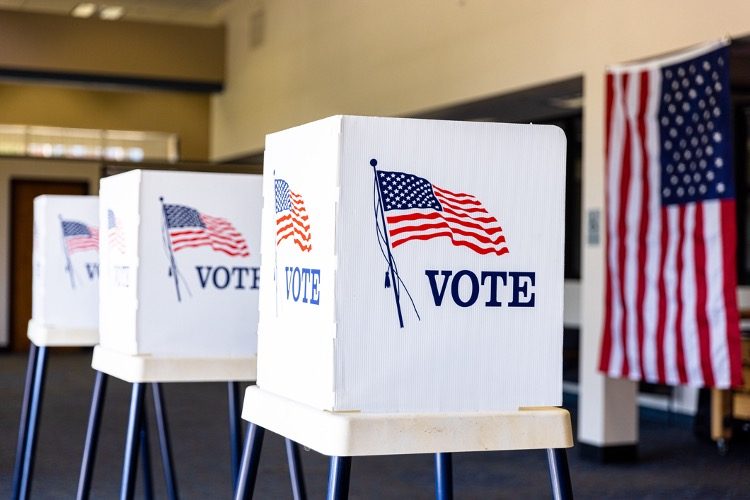
The results of Nevada’s Republican and Democratic primaries vividly illustrate what is wrong with the string of partisan presidential primaries that are held every four years in the United States.
With former President Donald Trump opting out of the state-run Republican primary, the only candidate bothering to participate was former South Carolina Governor Nikki Haley. The Nevada Republican Party does not allow candidates to participate in the party caucuses, set to be conducted Thursday night, if the candidate participates in the state-run primary. Trump is expected to win all 26 Nevada delegates to the Republican National Convention in the caucuses, in which participation is limited to persons who have been registered as Republicans.
Despite her being the only candidate actually participating in the primary, Haley lost, as “None of these candidates” garnered 63 percent of the vote to only 31 percent of the vote for Haley. Two candidates who have since dropped out of the race, Senator Tim Scott of South Carolina and former Vice President Mike Pence, combined for about five percent of the vote.
Democratic Governor Steve Sisolak signed the bill creating the state-run primary in 2021. The state’s Republican Party opposed the action, preferring that their party’s delegates to the national convention continue to be chosen in caucuses.
While only party members can participate in the Nevada primary, the state allows same-day registration, both for new voters and for voters changing their registration. This allows a Democrat to change his registration, for example, on election day, just to mess things up.
This illustrates one of the biggest problems with presidential primaries funded by the state government, rather than by political parties, which are private organizations. For example, in New Hampshire, Haley was the beneficiary of thousands of votes from Democrats and Independents who opted to vote in the Republican primary. Although she still lost to Trump by double digits, these quadrennial primaries are often marred by members of one political party casting votes in the opposing party’s primary.
In short, people who are registered members of one political party get to vote in the other party’s primary and play a role in determining who gets delegates to the national convention that nominates a candidate for president. This is like Baptists voting on who is going to be the next pope in the Roman Catholic Church, or Catholics choosing the deacons in a Baptist church.
The use of primaries largely originated during the “Progressive Era” of the late 1800s and early 1900s, under the theory that more people should be able to vote on more things.
But is it really the case that more citizens have a voice in the selection of the president under our current system? We are hardly a few weeks into the “primary season” and it is already clear that — barring some very unusual event — Trump will be the Republican nominee and Joe Biden will be the Democratic nominee. Yet, only citizens in Iowa, New Hampshire, and Nevada have voted.
Despite this, states will spend millions of dollars of taxpayer money on rather meaningless primary elections strung out over the next few months. The reality is that were political parties forced to fund their own primaries, most would choose to have less-expensive caucuses, and more citizens would get to cast meaningful votes.
Those party activists who attend caucuses also tend to cast more informed votes than less-informed primary voters. They are less influenced by the glitz and glamour and machinations of the mainstream media. Political consultants, on the other hand, absolutely love primaries, because it fattens their pocketbooks every four years.
Why should non-party members get to vote the other party’s primary? The opportunity for mischief is obvious. While it is usually less-conservative Republicans such as the late Senator John McCain who benefit from these “open” primaries, conservative radio broadcaster Rush Limbaugh urged Republicans to vote in the Democratic Party primaries in 2008 after McCain had already pretty much wrapped up the Republican nomination, leaving Republicans to mess things up for the Democrats.
Limbaugh dubbed it “Operation Chaos,” in which he urged his listeners to vote for Hillary Clinton to delay the ultimate victory of Barack Obama and thus benefit the Republican candidate. While Republicans understandably found it humorous, is this really the way we should be selecting candidates for president of the United States?
If the state governments butted out, the each state’s political parties would be free to have their delegates chosen by a party-run primary or party-conducted caucus, or some combination of both.
One argument against the caucus system for choosing delegates is that some citizens are unable to attend an evening caucus because of work schedules, health reasons, or some other legitimate excuse. The truth is, however, that these are issues that could be handled by a political party. A party-run primary, for example, could choose some of the delegates, while the caucus could choose the rest. Utah uses a hybrid system to choose its major candidates. This is the way that Mike Lee ousted a moderate Republican years ago to become the party’s nominee for U.S. Senate.
Moving the selection of party candidates out of the hands of the state and into the hands of the parties would increase participation and result in a more-informed electorate.
Perhaps the biggest problem we have right now is that uninformed voters are cancelling out the votes of more-informed citizens. And perhaps that is the way those with a vested interest in the broken system we now have like it.

